Migrant crisis: Cyprus threat to EU-Turkey deal
- Published
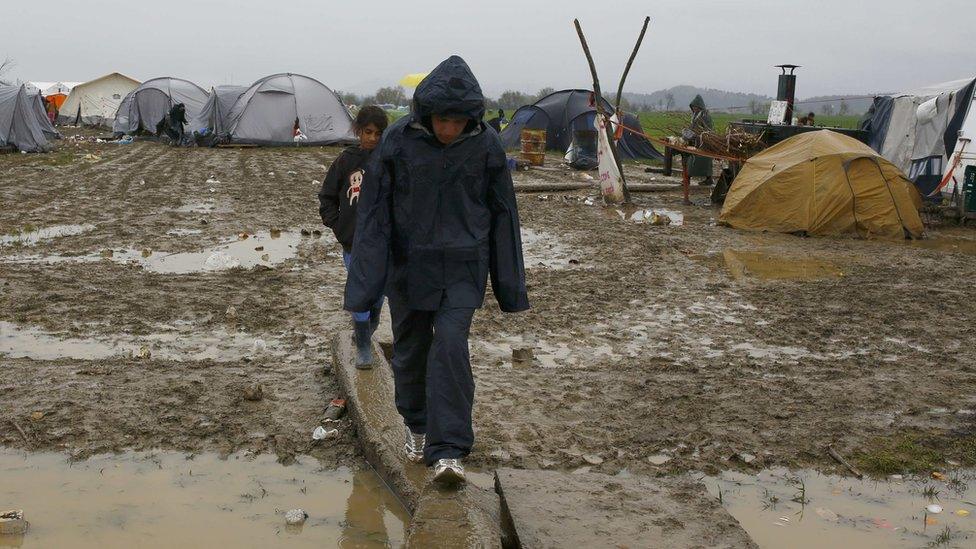
Some 14,000 people, mainly from Syria and Iraq, are living in squalid conditions on Greece's northern border
Cypriot President Nicos Anastasiades has rejected the terms of an EU offer to Turkey to resume membership talks, jeopardising a deal to send back migrants landing on the Greek islands.
The short boat trip from Turkey has become the most popular route to the EU for migrants and refugees.
Turkey agreed last week to take back the new arrivals in return for EU concessions.
But Cyprus has said that Turkey will have to agree concessions of its own.
One million irregular migrants, external have taken the sea route from Turkey since the start of 2015 and several countries along the Balkan route have recently acted to halt the influx. Macedonia has closed its Greek border crossing at Gevgelija, leaving at least 44,000 currently stranded in Greece.
'Important juncture'
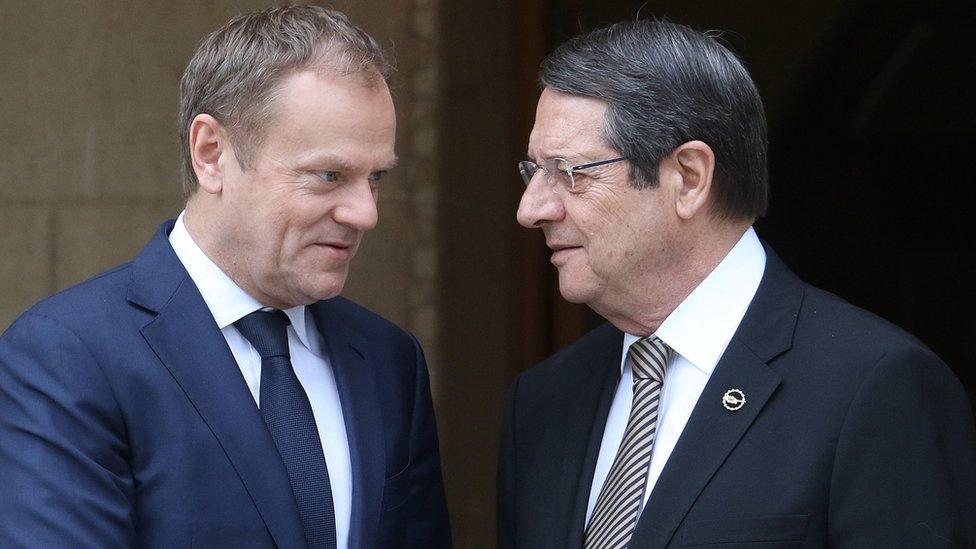
The European Council president (L) met Mr Anastasiades before heading for further talks in Turkey
Speaking after talks in Nicosia with European Council President Donald Tusk, Mr Anastasiades explained that Turkey first had to "fulfil its obligations", such as recognition of the Cypriot government and opening up Turkish ports and airports to passengers and trade.
The island of Cyprus has been divided since the Turkish military invaded the north in 1974 in response to an Athens-inspired coup.
However, the election of Mustafa Akinci as Turkish Cypriot President last year has injected new hope of reunification and UN-backed talks are said to be at an important stage.
EU and Turkey plan one-in, one-out deal
Cyprus aims to heal its great divide
Mr Tusk told reporters he had not come to Nicosia to "exert pressure on Cyprus" and he understood that talks on a settlement in Cyprus were at an important juncture.
He conceded that the migrant deal "still needs to be rebalanced so as to be accepted by all 28 member states and the EU institutions", he said in a statement, external.
Mr Tusk was due to hold talks with Turkish leaders later on Tuesday in an attempt to reach a deal ahead of an EU migration summit on Thursday.
Under a broad deal thrashed out with Turkey last week, all migrants arriving in Greece from Turkey would be returned - and for any Syrian sent back, a Syrian already in Turkey would be resettled in the EU. Turkey would also get extra funding and progress on EU integration.
UN and human rights officials have already suggested that the agreement may flout asylum laws, although that has been denied by EU and Turkish officials. Spain, too, has warned that it sees the deal as unacceptable.
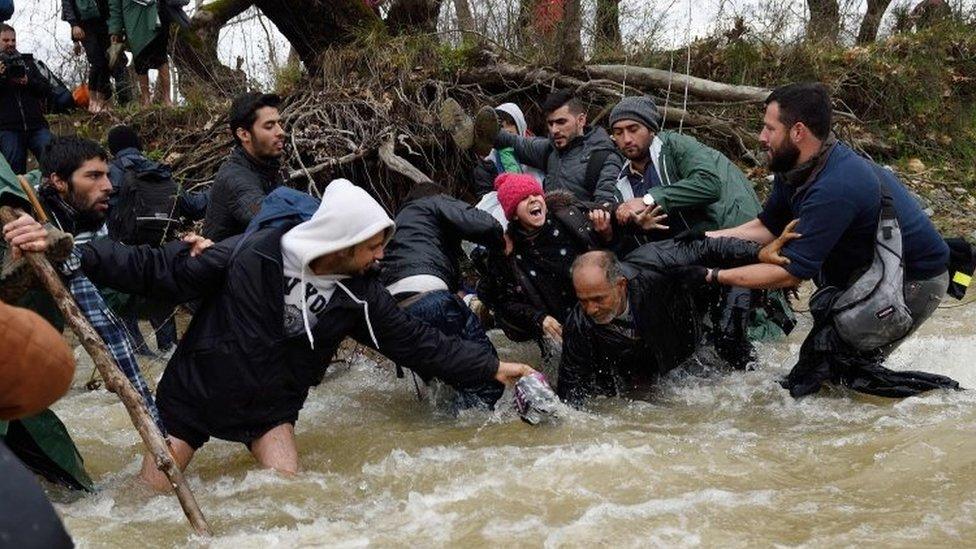
Children were carried across the fast-flowing river
The need for an agreement has become more urgent because of a mounting crisis on the Greek border with Macedonia, where more than 1,000 migrants, including children, crossed a river on Monday in an effort to get past a border fence.
They formed a human chain to help each other across. Two women and a man had earlier drowned trying to cross a river in the area.
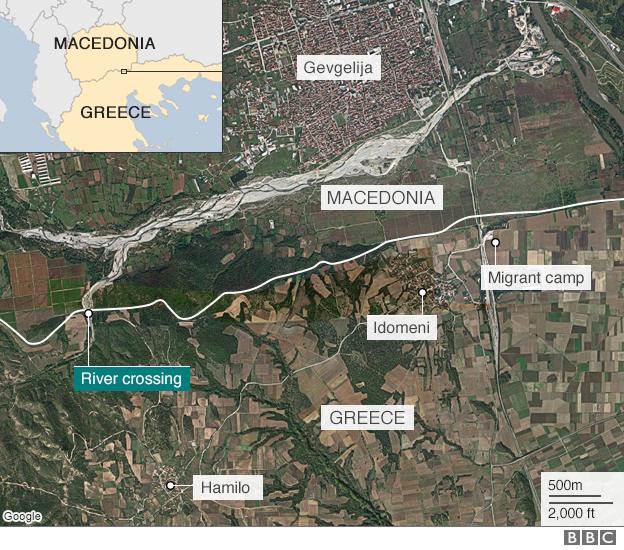
The migrants were picked up on Monday by Macedonian authorities and eventually returned to Greece. The Save the Children charity complained that Macedonia had sent children back during the night "shivering, wet and disorientated".
Syrian refugee Narmeen complained that they had been misled. "They told us to keep walking, they'll let us in, and we'll be done with all the rain and the cold. But [the Macedonians] didn't let us through."
European Migration Commissioner Dimitris Avramopoulos on Tuesday visited the border camp at Idomeni, where some 14,000 people are living in appalling conditions. "This tests the principles and values of the civilised world, and Europe," he said, complaining that fences on closed borders were against European values.
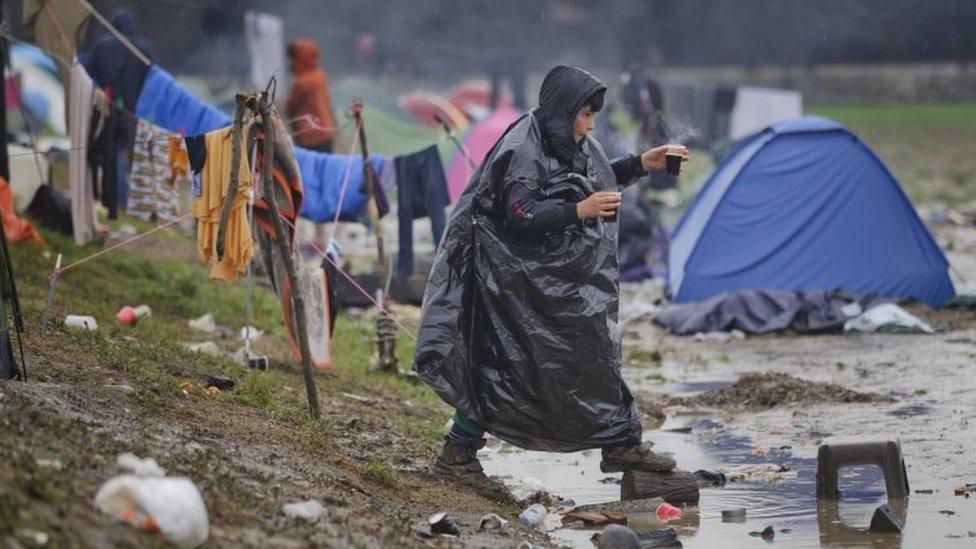
Conditions at the Idomeni camp have deteriorated following days of heavy rain


What is in the EU-Turkey proposal?
The EU leaders said "bold moves" were needed, and made the following proposals:
All new irregular migrants crossing from Turkey to Greece will be returned to Turkey. Irregular migrants, external means all those outside normal transit procedures, ie without documentation
In exchange for every returned Syrian, one Syrian from Turkey will be resettled in the EU
Plans to ease access to the EU for Turkish citizens will be speeded up, with a view to allowing visa-free travel by June
EU payments of €3bn ($3.3bn; £2.2bn) promised in October will be speeded up, with the possibility of further aid to help Turkey deal with the crisis. Turkey reportedly asked for the sum to be doubled
Preparations will be made for opening new chapters in talks on EU membership for Turkey

A note on terminology: The BBC uses the term migrant to refer to all people on the move who have yet to complete the legal process of claiming asylum. This group includes people fleeing war-torn countries such as Syria, who are likely to be granted refugee status, as well as people who are seeking jobs and better lives, who governments are likely to rule are economic migrants.